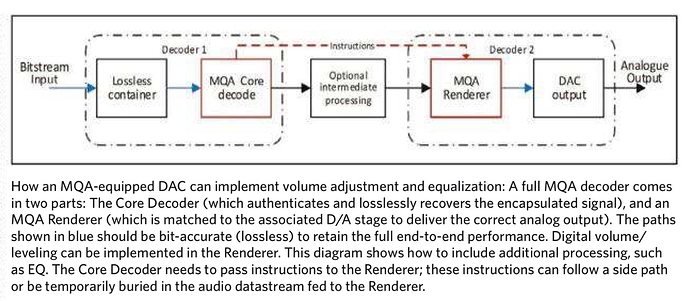That was sorted out before the January announcement, but it was a contributing factor to the length of the negotiation. Danny floated the possibility of a separate charge to us and then that was ruled out. The agreed licensing details haven’t been announced.
In the latest Stereophile May 2018 issue, there’s a new updated MQA flows from the previous one. This new MQA flows allows DSP and Room correction after the first unfold. A separate path called ‘instructions’ (highlighted in red) will send the necessary information to the ‘Renderer’ so that the correct up-sampling and de-blurring filters can be selected. Without this separate path(previous version), the information must be buried after the first unfold and will not survive if it goes to DSP and Room correction.
At least this a piece of good news for people for wants DSP and Room correction. In this instance, this is applied in hardware, for software there’s a possibility that the ‘renderer’ can be incorporated if the external DAC is known; the maximum sample rate and a optimised de-blurring filter that will work across large numbers of DACs out there.
so a year and half they have been saying it and have walked back things a few times.
sounds like politics but it’s unfair to lead everyone else along for the ride.
Good news yes, but have you noticed how many times the word lossless or losslessly is used in the text and diagram? Somewhat economical with the truth…
I would say, MQA is a hybrid ‘lossy-lossless’ compression system. It will behave like a ‘lossless’ provided the source is 24 bit/44.1/48kHz.
Anything higher than 44.1/48kHz sample, for example 88.2/96kHz sample and above then some of bits from the audio range (20Hz-20kHz) will need to code the higher frequencies (22.05/24kHz to 44.1/48kHz) resulted in lower resolution in the audio range (lossy).
At a quick glance only, Tidal MQA releases appear to have slowed since the beginning of the year.
The guys tracking this stuff seem to hint something similar.
There’s a possibility it is losing steam… that may attribute to lower than usual Tidal subscribers and the lower than average adoption of the format.
Agreed, there could be a variety of reasons. Still, it’s an interesting observation.
I think we need to pause for a bit…
There could be a situation where MQA Ltd agreed to a setup, then changed their mind. So maybe Roon thought they had ironed out all licensing issues to then find out that either MQA Ltd changed their mind, argued they didn’t understand a corner case, or something in between.
There could also be a situation where TIDAL refuses to indicate that a file is MQA encoded - so the only choice is for Roon to determine that in realtime, which likely would render a bad user experience.
I don’t think there’s any technical issues to be solved in terms of implementing the code.
Not exactly…
Issues:
1- This mechanism makes it complex to send “instructions” to the renderer - MQA is looking to be the provider/controller/monetizer of the DSP step.
2- It would make a lot more sense - to me - to fully unfold the signal first, getting the most accurate high-res stream, then applying DSP. Applying DSP in between makes no sense at all.
Maybe there is a MQA acceptance problem.
Too many “marketing” news, no substance.
I hope they rethink giving it away for free. Users should have to pay for it and it should be a plug-in to avoid extra licensing for non MQA users.
Put the savings on licensing to the mobile solution and other cool stuff on the road map.
I agree. That’s always been a sticking point. I will venture MQA Ltd is not ok with such arrangement, obviously.
Aurender has a purchasable MQA first unfold add-on, I wonder if Bob gets paid only for actual purchases.
Interesting. I did not know it is an add-on. My understanding is that Aurender and Mytek are two DACs that do not disable the MQA-style filter when playing a non-MQA stream. Which means the add-on improves the DAC’s performance while playing MQA and degrades it while playing standard PCM. Just great! ![]()
![]()
![]()
Saying it “degrades” standard PCM is a bit harsh, isn’t it?
After all, its just a filter like any Slow, Sharp, Short or whatever?
Well, if you look at what many (most? all?) DAC manufacturers have considered to be a good filter, they are certainly not what the MQA filters look like. Take a look at:
Also consider that the Dragonfly implementation of rendering (on a $99 DAC) does not have this issue.
Interesting. My understanding is you can go back to the original filter behavior if you turn MQA off - but if you have it enabled and you play a standard PCM file, it will not revert back to standard Aurender PCM filters.
That charge from Aurender is $49.99 plus taxes. Does anyone know if this reflects what MQA costs/charges per unit or does it reflect implementation costs by Aurender? I expect that these issues will be commercially confidential so we will never know.
